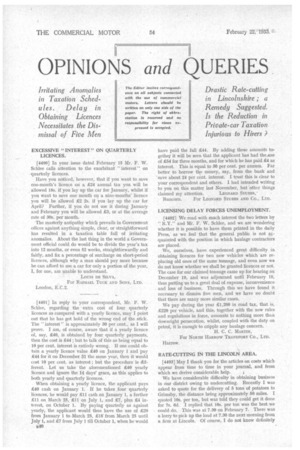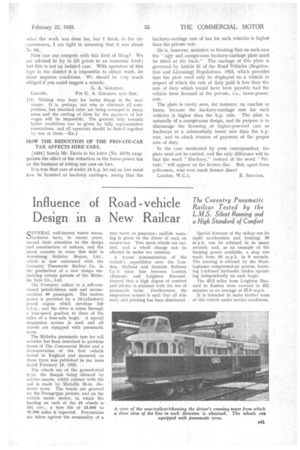OPINIONS and QUERIES
Page 58

Page 59

If you've noticed an error in this article please click here to report it so we can fix it.
Irritating Anomalies in Taxation Schedules. Delay in Obtaining Licences Necessitates the Dismissal of Five Men Drastic Rate-cutting in Lincolnshire ; a Remedy Suggested. Is the Reduction in Private-car Taxation Injurious to Hirers ?
EXCESSIVE " INTEREST " ON QUARTERLY LICENCES.
[4490] In your issue dated February 15 Mr. F. W. Schlee calls attention to the exorbitant " interest " on • quarterly licences.
Have you noticed, however, that if you want to save one-month's licence on a £24 annual tax you will be allowed I8s. if you lay up the car for January, whilst if you *ant to save one month on a nine-months' licence you will be allowed £2 2s. if you lay up the car for April? Further, if you do not use it during January and February you will be allowed 13, or at the average rate of 30s. per month.
The masterly antipathy which prevails in Government offices against anything simple, clear, or straightforward has resulted in a taxation table full of irritating anomalies. About the last thing in the world a Government official could do would be to divide the year's tax into 12 months, or even 52 weeks, straightforwardly and fairly, and fix a percentage of surcharge on short-period licences, although why a man should pay more because he can afford to use a car for only a portion of the year, I, for one, am unable to understand.
LOUIS DE SILVA, For RAPHAEL TUCK AND SONS, LTD. London, E.C.2.
• [4491] In reply to your correspondent, Mr. F. W. Schlee, regarding the extra cost of four quarterly licences as compared with a yearly licence, may I point out that he has got hold of the wrong end of the stick. The " interest " is approximately 30 per cent., as I will prove. I am, of course, aware that if a yearly licence of, say, £40, is obtained by four quarterly payments, then the cost is £44; but to talk of this as being equal to 10 per cent. interest is entirely wrong. If one could obtain a yearly licence value £40 on January 1 and pay £44 for it on December 31 the same year, then it would cost 10 per cent, as interest ; but the procedure is different. Let us take the aforementioned £40 yearly licence and ignore the 14 days' grace, as this applies to both yearly and quarterly licences.
When obtaining a yearly licence, the applicant pays £40 cash on January 1. If he takes four quarterly licences, he would pay £11 cash on January 1, a further £11 on March 25, £11 on July 1, and £7, plus £4 interest, on October 1. By paying quarterly as against yearly, the applicant would thus have the use of 129 from January 1 to March 25, £18from March 25 until July 1, and £7 from July 1 till October I, when he would
1340 have paid the full £44. By adding these amounts together it will be seen that the applicant has had the use of £54 for three months, and for which he has paid £4 as interest. This is equal to 30 per cent. per annum. Far better to borrow the money, say, from the bank and save about 24 per cent. interest. I trust this is clear to your correspondent and others. I had intended writing to you on this matter last November, but 'other things claimed my attention. LEONARD STUBBS, Runcorn. For LEONARD STUBBS AND CO., LTD.
LICENSING DELAY FORCES UNEMPLOYMENT.
[4492] We read with much interest the two letters by R.Y." and Mr. F. W. Schlee, and we are wondering whether it is possible to have them printed in the daily Press, as we feel that the general public is not acquainted with the position in which haulage contractors are placed. We, ourselves, have experienced great difficulty in obtaining licences for two new vehicles which are replacing old ones of the same tonnage, and even now we do not know whether we shall be granted licences or not. The case for our claimed tonnage came up for hearing on December 19, and was adjourned until February 18, thus putting us to a great deal of expense, inconvenience and loss of business. Through this we have found it necessary to dismiss five men, and we have no doubt that there are many more similar cases.
We pay during the year £1,200 in road tax, that is, £220 per vehicle, and this, together with the new rules and regulations in force, amounts to nothing more than downright persecution, whilst, coupled with the duty on petrol, it is enough to cripple any haulage concern.
H. C. C. MARTIN, For NORTH HARROW TRANSPORT CO., LTD. Harrow.
RATE-CUTTING IN THE LINCOLN AREA.
[4493] May I thank you for the articles on costs which appear from time to time in your journal, and from which we derive considerable help.
We have considerable difficulty in obtaining business in our district owing to undercutting. Recently I was asked to quote for the delivery of 5 tons of potatoes to Grimsby, the distance being approximately 50 miles. I quoted 10s. per ton, but was told they could get it done for 7s. 6d. I replied that 10s. per ton was the best we could do. This was at 7.30 on February 7. There was a lorry to pick up the load at 7.30 the next morning from a firm at Lincoln. Of course, I do not know definitely what the work was done for, but I think, in the circumstances, I am right in assuming that it was about 7s. 6d.,
How can one compete with this kind of thing? We are advised to try to lift prices to an economic level ; but this is not an isolated case. With operators of this type in the district it is impossible to obtain work, let alone improve conditions. We should be very much obliged if you could suggest a remedy.
G. A. GOLDING,
Lincoln. For G. A. GOLDING AND SON.
[Mr. Golding may hope for better things in the near future. It is, perhaps, not wise to eliminate all competition, but standard rates are being arranged in many areas and the cutting of these by the payment of low wages will be . impossible. The greatest help towards tetter conditions can be given by fully representative associations, and all operators should be linked together by one of these.—En.)
HOW THE REDUCTION OF THE PRIVATE-CAR TAX AFFECTS HIRE CARS.
[4494] Surely Mr. Davis in his letter (No. 4479) exaggerates the effect of the reduction in the horse-power-tax on the business of letting out cars on hire.
It is true that cars of under 14 h.p. let out on hire must now be licensed as hackney carriages, seeing that the
hackney-carriage rate of tax for such vehicles is higher than the private rate.
He is, however, mistaken in thinking that on such cars the 'ugly and conspicuous hackney-carriage plate must be fitted at the back." The carriage of this plate is governed by Article 31 of the Road Vehicles (Registration and Licensing) Regulations, 1924, which provides that the plate need only be displayed on a vehicle in respect of which the rate of duty paid is less than the rate of duty which would have been payable had the vehicle been licensed at the private, i.e., horse-power; rate.
The plate is rarely seen, for instance, on coaches or buses, because the hackney-carriage rate for such vehicles is higher than the h.p. rate. The plate is naturally of a conspicuous design, and its purpose is to discourage the licensing of higher-powered cars as hackneys at a substantially lower rate than the h.p. rate, and to check evasion of payment of the proper rate of duty.
In the case mentioned by your correspondent, the plate need not be carried, and the only difference will be that the word "Hackney," instead of the word " Private," will appear on the licence disc. But, apart from policemen, who ever reads licence discs?
London, W.C.1. E. SPENCER.




































































































